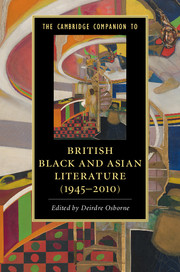Book contents
- Frontmatter
- Dedication
- Contents
- Contributors
- Acknowledgements
- Timeline
- Introduction
- PART I TRACES AND ROUTES
- PART II TRANSLOCATIONS AND TRANSFORMATIONS
- 3 Liberationist Political Poetics
- 4 Women's Fiction and Literary (Self-) Determination
- 5 Brutalised Lives and Brutalist Realism: Black British Urban Fiction (1990s–2000s)
- 6 Stages of Representation
- PART III RESTORATIONS AND RENOVATIONS
- PART IV NATIONAL, INTERNATIONAL, TRANSGLOBAL
- Further Reading
- Index
- Series list
3 - Liberationist Political Poetics
from PART II - TRANSLOCATIONS AND TRANSFORMATIONS
Published online by Cambridge University Press: 05 September 2016
- Frontmatter
- Dedication
- Contents
- Contributors
- Acknowledgements
- Timeline
- Introduction
- PART I TRACES AND ROUTES
- PART II TRANSLOCATIONS AND TRANSFORMATIONS
- 3 Liberationist Political Poetics
- 4 Women's Fiction and Literary (Self-) Determination
- 5 Brutalised Lives and Brutalist Realism: Black British Urban Fiction (1990s–2000s)
- 6 Stages of Representation
- PART III RESTORATIONS AND RENOVATIONS
- PART IV NATIONAL, INTERNATIONAL, TRANSGLOBAL
- Further Reading
- Index
- Series list
Summary
The Politics of Language
In his lectures on the History of the Voice (1979), Barbadian poet and historian (Edward) Kamau Brathwaite claims that the poetic traditions and linguistic standards imposed by British colonialism are inept at representing Caribbean experiences. Stressing the alienating effects of colonial education, Brathwaite argues that the rhythms of English poetry, particularly the prevalence of the iambic pentameter, are incompatible with Caribbean speech rhythms and intonations: ‘In other words, we haven't got the syllables, the syllabic intelligence, to describe the hurricane, which is our own experience, whereas we can describe the imported alien experience of the snowfall.’ As ‘the hurricane does not roar in pentameters’, the imposition of English poetic traditions onto Caribbean worlds inevitably yields figurative misrepresentations and distortions.
To move beyond European conventions and alienating structures, Brathwaite, together with a number of other Afro-Caribbean male writers (John La Rose, Andrew Salkey, James Berry and E. A. Markham), engaged with the social and political nature of language. Foregrounding the sonic dimension of black orality, these writers, in different yet interrelated ways, worked towards establishing a Caribbean poetics, to give voice to Caribbean realities and assert alternative modes of expression. Although initially designed as a localized diction in the service of post-colonial nation-building, this poetics was carried along post-war migratory routes, giving rise to a rich and varied black British tradition. The intentional focus upon this cluster of male poets is accounted for chronologically (they were published from the 1960s and 1970s) and by no means discounts the ground-breaking work of Trinidadian-born Amryl Johnson and Jamaican-born Valerie Bloom, poet-performers whose work showcases the dexterities of Creole and patois and was published from the 1980s onwards.
According to Brathwaite, Caribbean poetic diction should be based on ‘nation language’, a Creole variety to which English may give ‘some of its lexical features’ but which ‘in its contours, its rhythm and timbre, its sound explosions…is not English’. Nation language, as defined by Brathwaite, is shaped by a largely suppressed African heritage that comes to the fore in specific words, syntactic forms and sounds of the language. In nation language, standard English has already been recast into genuinely Caribbean speech patterns so the use of this local variety displaces the authority of colonial norms.
- Type
- Chapter
- Information
- Publisher: Cambridge University PressPrint publication year: 2016
- 3
- Cited by



